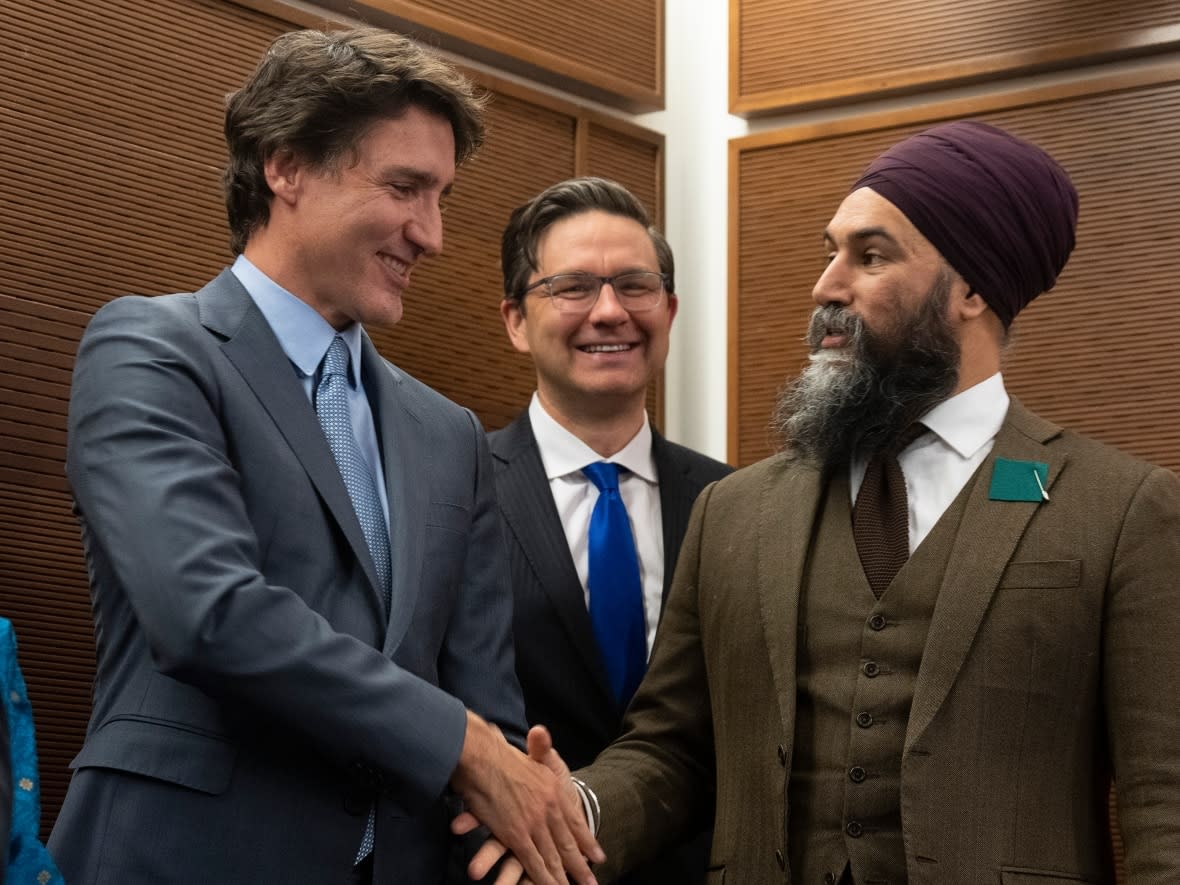Conservatives, NDP criticize budget's impact on people, businesses as Trudeau defends measures

Opposition leaders took turns criticizing the 2023 federal budget as Prime Minister Justin Trudeau defended the document he said would help insulate Canadian consumers from the high cost of living and the ongoing threat of foreign interference.
"There's a lot of waste, and there's never been as much waste than what we're seeing now," Conservative Leader Pierre Poilievre said Wednesday.
Poilievre wouldn't say whether he would keep the budget's tax credits for investments in green energy should he become prime minister.
"We'll have to see what they do. So far all they've done is raise taxes on businesses that are trying to create jobs. They brought in a carbon tax that drives away business, they brought in regulatory red tape that stops us from building these businesses," he added.
WATCH: Clean tech subsidies raise taxes on businesses trying to create jobs, says Poilievre:
NDP Leader Jagmeet Singh said his party is pleased the budget included an expansion of the federal dental care program — a program the Liberals had to broaden to retain the NDP's support in the House of Commons on confidence votes.
"We're proud but we're not satisfied," he said.
The Canada Dental Benefit was introduced last year to help low-income families pay for dental work. The first stage of the program provided tax-free payments of $260, $390 or $650 for each eligible child under 12, depending on their family's net income.
As a part of the Liberals' agreement with the NDP, the program was expanded in the budget to include Canadians under 18, seniors and persons living with a disability.
While Poilievre said his party would not support the budget, Singh said the New Democrats would do so despite being disappointed by some parts of it.
Singh said he was disappointed by the government's promise to introduce legislation by the end of the year to prevent the use of replacement workers during a strike or lockout in a federally regulated industry.
"I'm not satisfied because we know how much more we could accomplish together if this was truly a New Democrat budget," he said. "We would not be dragging our feet on anti-scab legislation. We would get it done."
Singh also said the budget didn't do enough to ensure big corporations and CEOs pay what they "owe." He did not say whether he meant that they're not paying the taxes they owe, or that they're taxed at rates that are not high enough.
WATCH: 'We're proud but we're not satisfied:' Singh on the budget:
The budget did announce some measures to target wealthy individuals and corporations on the tax front. It pledged to increase federal revenue by $2.9 billion over five years by ensuring the wealthiest Canadians pay their fair share of taxes.
The budget said the Alternative Minimum Tax rate (AMT) of 15 per cent would be raised to 20.5 per cent at the beginning of the 2014 tax year.
The AMT sets a minimum tax rate to ensure that wealthy Canadians cannot use deductions, credits and other tax preferences to pay little or no tax in a given year. The budget said the Liberal government will "further limit the excessive use of tax preferences."
The budget also proposed taxing share buy-backs and dividends received on Canadian shares held by financial institutions beginning next year. The government said the move would net the treasury $5.65 billion over five years.
Singh's $1,700 in savings
The NDP leader said he was pleased to see in the budget a boost to Indigenous housing and a rule in the green economy investment credit package requiring that qualifying businesses pay employees a total compensation package equal to the existing union wage for the same or comparable jobs, including pensions and benefits.
He said he was particularly proud of the "grocery rebate," a one-time hike to the GST rebate which will provide up to $467 for families, $234 for singles and up to $255 for seniors, at a cost of $2.5 billion.
"With dental care and the GST rebate combined, New Democrats are saving families $1,700 per year. That's the break people need right now," he said.
The GST rebate is calculated based on income and an individual's family status, and not everyone receives the full amount.
Trudeau defended Finance Minister Chrystia Freeland's budget Wednesday, saying it will help Canadians struggling with rising interest rates and inflation.
"This is a time where Canadians need that extra support," Trudeau said. "We're seeing inflation coming down, which is a good thing, which is a response to the measures we've put forward, [but] food prices for example are still too high.
"That's why we're bringing in significant supports ... [for] eleven million Canadians who need it the most."
Trudeau said the creation of green tax credits would help create high paying jobs and dental and health investments would help reduce costs for services that "remain top of mind for Canadians."
The budget earmarks $49 million over three years for the RCMP to help protect new Canadians and their communities from harassment and intimidation by foreign governments.
It also offers $13.5 million over five years starting in 2023-24, and $3.1 million ongoing, to Public Safety Canada to create a National Counter-Foreign Interference Office.
Trudeau said these investments ensure the security services "have the resources necessary to [deal with] the very real and ongoing threats of foreign interference, whether it be in our businesses, in our politics, in our academic institutions."


